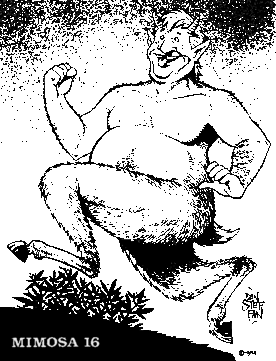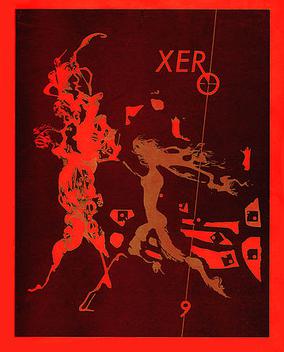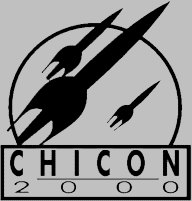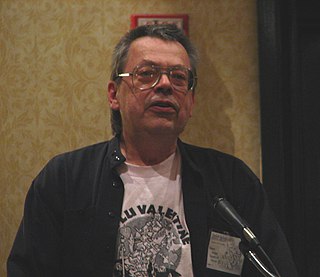Related Research Articles

A fanzine is a non-professional and non-official publication produced by enthusiasts of a particular cultural phenomenon for the pleasure of others who share their interest. The term was coined in an October 1940 science fiction fanzine by Russ Chauvenet and first popularized within science fiction fandom, and from there the term was adopted by other communities.

James Benjamin Blish was an American science fiction and fantasy writer. He is best known for his Cities in Flight novels and his series of Star Trek novelizations written with his wife, J. A. Lawrence. His novel A Case of Conscience won the Hugo Award. He is credited with creating the term "gas giant" to refer to large planetary bodies.

A science-fiction fanzine is an amateur or semi-professional magazine published by members of science-fiction fandom, from the 1930s to the present day. They were one of the earliest forms of fanzine, within one of which the term "fanzine" was coined, and at one time constituted the primary type of science-fictional fannish activity ("fanac").

Tom Reamy was an American science fiction and fantasy author and a key figure in 1960s and 1970s science fiction fandom. He died at age 42 prior to the publication of his first novel; his work is primarily dark fantasy.

The Hugo Award for Best Fanzine is given each year for non professionally edited magazines, or "fanzines", related to science fiction or fantasy which has published four or more issues with at least one issue appearing in the previous calendar year. Awards were also once given out for professional magazines in the professional magazine category, and since 1984 have been awarded for semi-professional magazines in the semiprozine category; several magazines that were nominated for or won the fanzine category have gone on to be nominated for or win the semiprozine category since it was established. The Hugo Awards have been described as "a fine showcase for speculative fiction" and "the best known literary award for science fiction writing".
Mike Glyer is both the editor and publisher of the long-running science fiction fan newszine File 770. He has won the Hugo Award 12 times in two categories: File 770 won the Best Fanzine Hugo in 1984, 1985, 1989, 2000, 2001, 2008, 2016 and 2018. Glyer won the Best Fan Writer Hugo in 1984, 1986, 1988, and 2016. The 1982 World Science Fiction Convention (Worldcon) committee presented Glyer a special award in 1982 for "Keeping the Fan in Fanzine Publishing."
Walter Alexander Willis (1919–1999) was a well-known Irish science fiction fan, resident in Belfast.

Mimosa was a science fiction fanzine edited by Richard Lynch and Nicki Lynch. It won six Hugo Awards for Best Fanzine and was nominated a total of 14 times (1991-2004). The headquarters was in Gaithersburg, Maryland.

Xero was a fanzine edited and published by Dick Lupoff, Pat Lupoff and Bhob Stewart from 1960 to 1963, winning a Hugo Award in the latter year. With science fiction and comic books as the core subjects, Xero also featured essays, satire, articles, poetry, artwork and cartoons on a wide range of other topics, material later collected into two hardcover books.

Richard Allen Lupoff was an American science-fiction and mystery author, who also wrote humor, satire, nonfiction and reviews. In addition to his two dozen novels and more than 40 short stories, he also edited science-fantasy anthologies. He was an expert on the writing of Edgar Rice Burroughs, and had an equally strong interest in H. P. Lovecraft. He also co-edited the non-fiction anthology All in Color For a Dime, which has been described as "the very first published volume dedicated to comic book criticism"; as well as its sequel, The Comic-Book Book.

The 58th World Science Fiction Convention (Worldcon), also known as Chicon 2000, was held on 31 August–4 September 2000 at the Hyatt Regency Chicago, Sofitel Hotel and Fairmont Hotel in Chicago, Illinois, United States.

Stephen Willis Stiles was an American cartoonist and writer, coming out of the science fiction fanzine tradition. He won the 2016 Hugo Award for Best Fan Artist.

Trina Robbins is an American cartoonist. She was an early participant in the underground comix movement, and one of the first female artists in that movement. She is a member of the Will Eisner Hall of Fame.
Wayne MacDonald, known by his pen name Taral Wayne, is one of Canada's best known science fiction fan artists, and has been nominated for the Hugo Award for Best Fan Artist eleven times, from 1987 to 2012. In October 2008 he received the annual Rotsler Award. In recognition of his contributions to science fiction fandom, particularly Canadian fandom, Taral was named Fan Guest of Honour by the 2009 Worldcon, Anticipation.
Algol: The Magazine About Science Fiction was published from 1963–1984 by Andrew Porter. The headquarters was in New York City. The name was changed to Starship in 1979.
Izzard was a science fiction fanzine edited by Patrick Nielsen Hayden and Teresa Nielsen Hayden between 1982 and 1987. It was nominated for the Hugo Award in 1984. Contributors included Terry Carr, Steve Stiles, Greg Benford, Ted White, Greg Pickersgill, Avedon Carol, Dave Langford, Stu Shiffman, Taral Wayne, Ray Nelson and Alexis Gilliland.
The 26th World Science Fiction Convention (Worldcon), also known as Baycon, was held on 29 August–2 September 1968 at the Claremont Hotel in Berkeley, California, United States.
Trap Door is a science-fiction fanzine published by Robert Lichtman, with the first issue appearing in October 1983.

The Hugo Award is an annual literary award for the best science fiction or fantasy works and achievements of the previous year, given at the World Science Fiction Convention (Worldcon) and chosen by its members. The Hugo is widely considered the premier award in science fiction. The award is administered by the World Science Fiction Society. It is named after Hugo Gernsback, the founder of the pioneering science fiction magazine Amazing Stories. Hugos were first given in 1953, at the 11th World Science Fiction Convention, and have been awarded every year since 1955.
Argentus was a science fiction fanzine edited by Steven H Silver. It won the Chronic Rift Roundtable Award for Best Fanzine in 2009 and was nominated for the Hugo Award for Best Fanzine three times (2008–2010). The magazine ended publication in 2014.
References
- ↑ "Science fiction fanzine collection". Temple University. Retrieved 12 August 2020.
- ↑ "Locus Index to SF Awards: Hugo Nominees List". Archived from the original on 2011-09-20. Retrieved 2009-09-30.
- ↑ Steve Stiles. "Habakkuk Remembered." Vojo de Vivo #2, 2001; pp. 19-21